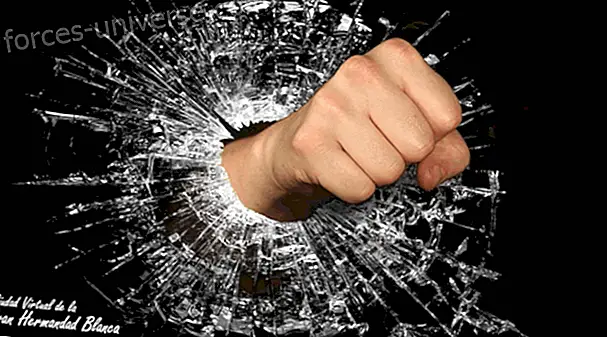This article will consist of explaining the two types of trauma that exist since the teachings of Virginia Gawen and that very few speak. Virginia is an Argentine psychologist, therapist, teacher and writer, known for disseminating Transpersonal Psychology in America. In 1994, she founded the Teanspersonal Center in Buenos Aires, Argentina, of which she is the director. In turn, he is a member of the Board of Directors of the International Transpersonal Association (ITA) and the Ibero-American Transpersonal Association (ATI). In this way, I bring you in this article, teachings, which will make you rethink and rethink a lot of preconceived ideas that you might never have questioned. It will bring you light to many situations that perhaps you felt, and very deeply, but you could not or could not name it. This theoretical jewel, but more than theoretical, is like a pamper to the soul, a light of love that will embrace your soul, will probably bring you peace, and consciousness, which may s deploy and share with who else you think is necessary.
Virginia Gawel: The Traumas of Omission Comments by Gisela S.
What is it?
We all have emotional scars, the gifts of traumas, within the popularization of psychology are considered something like that trauma is like getting ruined . As if it were a beautiful and beautiful jug, but a jug like that loses value. A person does not lose value by having trauma but will depend on how he processes it.
If you make a list of the people you value and admire, you will realize that they did not have an easy time, why is that?
Because they had the ability to turn trauma into a gift of virtue, a virtue, a capacity, it is something like if the trauma had gone to a gym of the spirit
There are two types of trauma and it is important to know that any of us may have experienced one or the other.
One is more popular than they are called commission traumas.
What does that mean? I do not want to be theoretical or technical. Commission means that someone or something committed something towards us, life committed a catastrophe, an accident, we have been passive subjects of something that happened to us. An abuse, an abuse, we were made something that traumatize us, what does this mean? He left us an emotional imprint, and that imprint needs to heal just like physical wounds.
But there is another kind of trauma, that there are times that one would not tell it, because it was not such a day such a thing happened to me, or my father did such a thing to me, or my grandfather, whatever.

They are the traumas of omission, what is that?
The trauma of omission is what did not happen, it is somewhat deaf, because it is not a fact, it is the absence of fact. It reminds me, for example, in my home of origin we have always been many affectionate, to hug, kiss and pamper ourselves and this continues among us, and all adults and more than adults, and I remember that my house, although I remember that there was It was a poor house, it was always a transit home for children who were left without potatoes, without potatoes because they were sick, because they were traveling, orphaned boys, that is, in poverty my mother decided particularly and my father, to welcome children in home of transit for a few months, and I remember the surprise of some of those children to see that we kissed good night for example or hugged each other or said cute things. That child who does not live that, has a trauma of omission, has as an affective anemia of what was not. The boy who goes, who has just made a drawing, a small baby, a beautiful, beautiful drawing of his whole family and shows it to the mother and asks for that little attention, and the mother is talking on the phone and says leave to disturb and makes a gesture with his hand and the baby insists and the gesture returns and the baby no longer insists . That probably does not remain as a great anecdote however there is a lack of appreciation, and those omission traumas are what we did not have, it is difficult sometimes to elaborate what we did not have, that we did not have breath, that we did not have support, that we did not We had physical pampering, as necessary to develop as people. That we did not have attention, that we did not have games, because the other could not give it, those traumas of omission are also something that we have to overcome, there are times that for example we need to train in the art of hugging, to say I love you, and It is harder for some people to say I love you than to claim or say an insult. Those are traumas too, omission traumas ...
This has to do with self-appreciation, with self-love, I sometimes modify the expression self-esteem ... that is correct and that is used clinically but notice that if I say of my best friend that I estimate it is little word To say how much I feel for my best friend, my partner, my mother, that I know. Self-tenderness, self-affection, self-affection, self-friendship are words that barely begin to be used, seeing how poor we have been, we have been so lacking that we even created a poor word to refer to that, and truly.
How do you overcome these traumas of omission and commission traumas?
The key point is when the person already beginning to be an adult, more consciously or almost without realizing it, assumes that he has to give himself what he did not receive. What we instinctively do, mechanically, is to find someone to give us what we don't receive. And there are times when we become frankly heavy, without realizing it. Because from the lack, we become yearning and demanding people, then especially in the area of the couple, sometimes in the area of friendship, we have a hole so large that the expectation we have is that the other makes us happy. That is to say, he gives us everything that we have not received, and the poor other, and if someone touched him to be that other, poor thing, he will be charged a quantity of bills of things that he did not buy. Then a link is overloaded.
I sometimes imagine it as those sockets that are called slippers, that one plugs in the refrigerator, the television, the music device and explodes. A plug does not support so much demand for appliances, fine. A link does not support that we load on it, the needs that were not covered at the time.

And how is it done so that that plug doesn't explode?
Fundamentally when one demands excessively abroad, that uncovered yearning means that the person still did not learn to give himself tenderness. We even talk about self-parentalizing, I don't want to talk difficult, it means being a father of oneself, being a mother of oneself and if one could not receive it, one could value oneself, be able to say oneself , words of encouragement. Recognize oneself and even do well.
Getting well What does it mean?
Look, it happens since I go to eat, I make a good rich meal, I put on a nice tablecloth, even if I'm alone at home, just like a mom would remove a creature from a link that makes her sick, you take yourself out, take the little arm away from people who do it wrong . It does not allow, as a mother would not allow a baby to mistreat her baby, she does not allow someone to mistreat her, she places herself in a place of dignity.
There is no lack worse than not counting on oneself. There is no lack worse.
And when we do not have ourselves, we expect a savior, a savior, who redeems everything we have not had, and there this is much seen in linking therapy, we realize that we are asking in friendship and especially in the couple, and sometimes of the children. Curiously there are moms and dads, especially moms who have been very lacking in childhood and hope that the children will give all the love that their parents did not give them . It is a curious transfer because it is projected on a younger figure, something that was of an older one, but this does happen and not to mention when the potatoes get older. And they expect their children to cover needs . Obviously the needs are there and affection needs to be given, but there is an excess of which the protagonist of that excess, of that excess demand does not always realize.

What is the job to do?
We are not broken and irreparable jugs, I usually imagine the ability as when the skin is injured, the body has, once we have spoken, a medicinal nature, the body knows how to regenerate what was hurt. If that exists in the body, it exists in our psyche.
Nowadays psychology gives it a name that is Resilience, which is derived from physics to that name, it means the ability to after a painful situation, to leave not only in its entirety, but more strengthened after having lived it. That's why those of the valuable people who have not had a good time, but who made that something worthwhile ...
The realization is the fundamental step and there are times that, I usually compare to the times that I have been able to travel, sometimes to another province where there are other customs, sometimes to another country, precisely because of the contrast of culture, One realizes that what they consider normal is simply a cultural conditioning . Then considering how one lives in the Puna or how one lives in Germany one realizes the cultural customs that one seems habitual and that life is like that.
Why am I mentioning this?
Because the help of a therapist makes us have a foreign look of what is normal for us. A therapist is like a foreigner in our life who says "oh how weird what you do, or see how you are about demanding of your child something that is not your child's responsibility to give it to you".
I remember once, for example, as a therapist, that is, as a foreigner, in something that was normal for a woman, I am talking about more than twenty years ago, I have been a psychologist for twenty-eight years, this woman had a first session, she was a mother single, of an only adult child. And I was very angry, it was not the reason for consultation, but that day he told me: "I am angry, today is the day of the woman, my son or a flower brought me." And it does not apply, it does not correspond to let your son live, if someone has to celebrate that he is a woman, it is not exactly your son, if it happens fantastic, but you cannot be bothered by that. For that person, it was normal for his son to give him a gift for women's day in previous years and it was not normal for him not to do that year .

Who can tell you these mistakes emotionally and this if it manifests here is because it manifests itself in a lot of other everyday gestures? And who can tell you?
A therapist can tell you , for that to happen. What is needed ? Awareness of help, awareness that help is needed, one needs to know that he needs help . In other words, no one can be taken to therapy, except for something very extreme, in case of an addiction, for example.
One needs to realize what? That something does not close and it is likely that I am the problem . And the truth is that I am always the problem, no matter if I am a battered woman or not, obviously I am facing a violent person who is hitting me, but the solution is always in me. There is something I can do, so seeking help is a very important step. And that therapist is like a foreign look that looks at what we consider normal in our lives, and that in general through questions or sometimes through relaxation sessions, we revoke aspects of what that it was our childhood, our growth, that we were given, that we lacked . There we see that this hole is manifesting itself today as a communicational symptom, that is to say that in today's communication we seek to repair something that we did not receive when we were boys . And sometimes we didn't receive it when we were kids because Dad worked from Sunday to Sunday, from five in the morning until eight at night. That was not an abandonment pope, he was a pope that the only possibility of supporting his family was working from sun to sun, from week to week, from year to year.

And there what was there? There was a paternal fault until he could retire, so that implies in me, and I am not talking about anything abstract, certain factors that are traumas of omission.
The point is not to arrive, and this is very important that I want to highlight, the condition of minor is not to realize, and I say that it is minor. The worst condition is to realize and guarantee, I am like that. What am I going to do? I am like that because what do you think of my father such a thing and my mother such another, then I justify that I am a legged lawsuit ...
There are times that someone could not because he was not constitutively in his emotionality, enabled to give love , there are potatoes, moms who have not given love because they could not emotionally or who mistreated ... they did not receive it and they did not know how to generate it . There are people who did not receive it, like my mother who grew up in the orphanages, and yet she is a great giver because she autogenerates him, from another place.
Why? Because we are not a broken jug, we are not beings of matter already defined that we get caught, dented and it's over. We are beings with the pottery capacity, if you want. To create ourselves, with what we were given, to do something new. We are malleable materials, and the malleability that when we were kids, generated gaps and scars, when we are big it starts to play in our favor and allows us to make ourselves, forge the character.
In Taoism that is a very interesting, very integrative psychology, very worthy of being integrated into the psychology of the West, it is said that in the first stage of life the character forges it from outside. Notice that even today, characters are the letters that one prints, eh. So character is something that is a seal from outside, from there comes the word, but when one begins to become aware of oneself, character one can forge it from within, they are no longer the others, then there is a point where the Psychology has helped many people to define that they are so because of childhood traumas, and there is another psychology that came later that tells you: "from that you have a solid base to be a great person . " I know that this is the case, I see it every day, and I am sure that you see it every day. From the disaster a great person can be made.

What is needed?
Labor, attitude of working with what was not given . That is what touched us, the materials, and each of us our own pains, commissions and omissions . But with that it is with what we can constitute what we choose to be as adults ...
I really like the word ... stereotyped, this is what transpersonal psychology talks about a lot . Krishnamurti talks a lot about this, curiously and we can take it for another day, instead of relating to who one is, with whom one feels, with whom one wishes to be what one would like to be, relates when he says yo, with an image of himself . And it is an old image, it is an image formatted on the outside, so the me that of my image, that me does not speak in public, for example, that I do not like certain things, that me, and that me Who is that me? That me is a crystallized, stereotyped image that I have to of me. But I am not that, I know much more than that, it is more cerebrally I am much more than that.

When the person realizes that and begins to cheer up, to expand the limits of his identity and his self-image, he begins to realize that the traumas of commission and omission are subsumed into something much bigger, and from from that he suffered, that person, no matter the work that he deploys in the world, will help others, even by his way of being he will help others, so that something that we sometimes fall into, in the stereotype ... or self-regret.
What do you want? How am I not going to do what I am with everything that happened to me?
Yes! with everything that happened to you, you can do something else, that is resilience, transform, we are called to transform ourselves, it is like that ...
In the faculty of psychology we are taught to obviously make a patient's medical history, you make a file or record after the session, take note that your father had, if his mother was, at what age he lost such a thing, that you traumas you had, and there is one, in the sixties when this psychology is born, appears A braham Maslow who was an extraordinary psychologist and urges that the therapist has to make a history of the patient's health, so that you have talent? What do you like to do? Do you collaborate in an aid institution? Who are your best friends? What do you enjoy Where is your creativity expressed? These things many psychologists ignore about his patient, so when a patient rings the bell, his psychologist is a trauma package. No , we are not that, we need to help the person to modify, turn the axis of their identity towards that which is what really does them good.
Editor: Gisela S., editor of the great family of https://hermandadblanca.org.
Source: https://www.youtube.com/watch?v=D_gnqR8tN1E&t=278s






